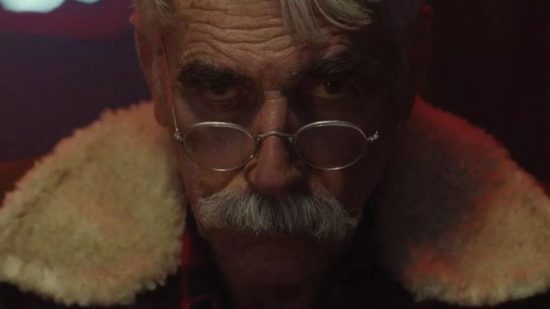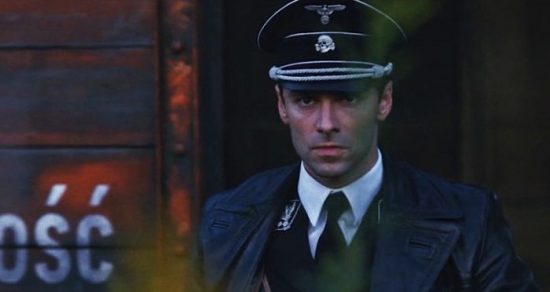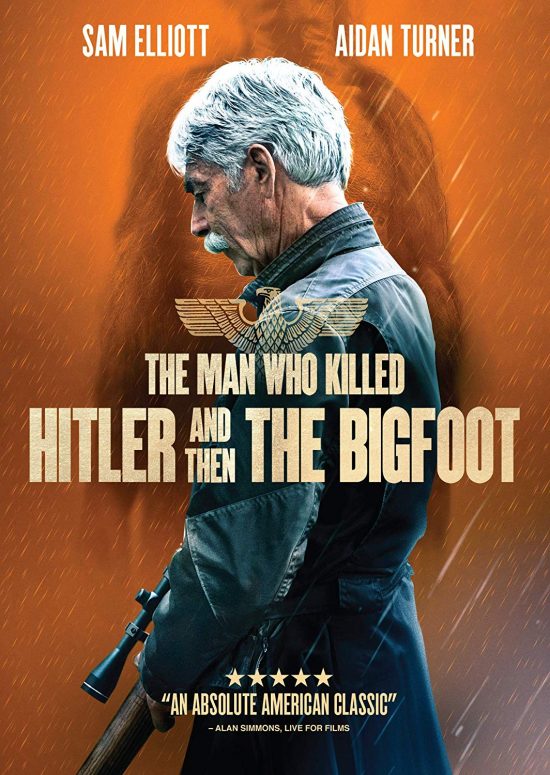Review: The Man Who Killed Hitler and then the Bigfoot – “A wonderfully unusual gem of a film”
Directed by Robert D Krzykowski
Starring Sam Elliott, Aidan Turner, Caitlin FitzGerald, Larry Miller
Several things drew me to this film: it went down well at its FrightFest debut (always a good sign – you can read Alan’s review of that screening here), it features the excellent Sam Elliott, and, well, come on, really, how could I resist a film with a title like that?? Other than those things though, I knew very little about this film in advance, which is something of a rarity these days, and I really didn’t know what to expect at all – high-jinks? Satire? Crazy silliness? With that title you can see why you might suspect that sort of approach, but actually no, this is a very unusual piece of film work that ploughs it own furrow, at its own pace and with its own style, and I applaud all involved for sticking to their approach, because it delivered an absolute wee gem of a film (and naturally some quality Filmic Moustache from Elliott!).
Calvin Barr (Elliott), is an older gentleman, a World War Two veteran now living peacefully in a small town in New England. As with many of us, as the years advance he finds himself more and more thinking of the past than the present, much less the future, and while his body may sit in his favourite armchair or the bar stool of his local pub, his mind is increasingly elsewhere, thoughts drifting back to his youth, to what he had to do during the war, and also to his pre-war life, the quietly satisfying peace of his small town, falling in love with local teacher Maxine (Caitlin Fitzgerald from Masters of Sex), with Poldark heart-throb Aidan Turner playing the younger Calvin.
It’s into this present-day, quiet, fairly lonely life that agents of the US and Canadian governments intrude, asking him to take on a new mission – the legendary Bigfoot exists, and appears to have become infected with a deadly virus that it is spreading. For now it is contained in an isolated wilderness area, but if it escapes this containment the disease will spread, and they have no cure – they are looking at a possible end of civilisation-level pandemic. No others have been able to track and kill the Bigfoot, none have returned, and so this former special operations soldier, the man they sent to assassinate Hitler, is the only one they can turn to, despite his age, he is, once more, tasked with defending civilisation.
And yes, he did indeed complete that mission and kill Hitler – and no, that’s not a spoiler, given it is in the title of the film! You may well wonder how is it that he could have assassinated the Fuhrer since that clearly deviates from recorded history – so is this an alternate history reality? A time-travel paradox or similar? Nope, and I am not going to spoil it for you by explaining how they can have had Calvin kill Hitler in the 1940s but still be true to history, save to say they do come up with an explanation that works fine, allowing the film its conceit of a soldier killing Hitler without contradicting real history.
However, those two strands of the narrative – the wartime exploits of young Calvin and the present-day mission to find the Bigfoot before it can spread the virus – are not really what The Man Who Killed Hitler is about, they are just the narrative framing on which Krzykowski paints a gently-paced exploration of a man’s life, his younger self’s hopes, his older self’s regrets, and the way life can change everything you wanted, everything you planned, especially where war is concerned. “I never wanted to kill a man,” Calvin tells his brother Ed (Larry Miller), “Even if he had it coming.”
As we see more memories of the wartime mission, and the pre-war courting of Maxine contrasted with Elliott’s older Calvin we piece together his story and how the war changed everything, taking him away from the woman he wanted to marry and settle down with, how it lead to this quiet, thoughtful man having to kill and discovering he was good at it, quiet, methodical, making him a good agent even though he hates the idea of it, how it was never the same again afterwards. There’s an echo here in older Calvin of William Munny in Unforgiven, an older man carrying a lifetime of regret for past deeds, although in Calvin’s case he was battling the forces of evil, not an outlaw like Munny, but killing still takes a toll regardless, even if in a righteous cause.
It’s not hard to see Calvin as representing so many young men who answered the call from small towns in America, Canada, Britain and so many other lands, young lads who had been brought up decently, who had been taught Thou Shalt Not Kill but then were forced to do just that again and again during the war to protect the free world. Young lads who came back as men who had seen and done too much (those that got to come back, at least), changed inside, rarely talking about it but forever altered by the memories and guilt. Elliott has a way of carrying a quiet, reserved, dignified air to his characters and that works perfectly in this role (so much so I wonder if the role was written for him?) – no anguished emotional outbursts here, instead Elliott signifies the inner turmoil of Calvin through tiny expressions and body language, some great acting craft here using such little movements to express so much of the character’s inner thoughts and feelings.
This is a wonderfully unusual gem of a film, a richly emotional palette of hope and regret, youth and old age, carried very much on the shoulders of Elliott’s quiet performance, unfolding a piece at a time at a satisfyingly gentle pace, slowly bringing us into the world of this reserved veteran.
The Man Who Killed Hitler and then the Bigfoot is released by Sparky Pictures on digital from April 15th, and on DVD and Blu-Ray from May 6th.













